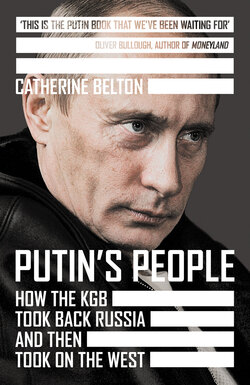Читать книгу Putin’s People - Catherine Belton - Страница 16
Submariner
ОглавлениеAs City Hall began to privatise part of its stake in the sea port, Ilya Traber, an alleged St Petersburg mobster later named by Spanish prosecutors as an associate of the Tambov organised-crime group, was quick off the mark.[53] His men bought up shares from the port’s workers, who’d received them as vouchers, as soon as the sell-off began. The process was violent. ‘There were huge violations in the privatisation of the port. But all this was covered up,’ said a former Traber associate.[54] From the beginning, Traber seemed to have an inside track. On paper, the state retained a 49 per cent stake in the port: 20 per cent through the federal property ministry, and 29 per cent through St Petersburg’s City Hall. But a clerk at the City Hall Property Department somehow lost the City Hall voting rights to the 29 per cent stake through a ‘mistaken’ stroke of a pen, leaving Traber and his associates free to do as they wished.[55]
‘The raider takeover would not have happened without help from the mayor’s office,’ said a former city FSB officer.[56] After a series of violent struggles, Traber, who’d become the quintessential intermediary between the St Petersburg KGB men and the Tambov group, established control over the oil terminal too.[57] He’d first arrived in Leningrad in the early eighties, as an ex-officer from the Soviet nuclear submarine fleet. A squat and burly man with a thick neck and close-set eyes, he’d washed up at a city-centre bar named Zhiguli,[58] a favourite haunt of Leningrad’s street thugs and budding black marketeers. Traber worked there as a barman and administrator, and in the bar’s dark reaches he began to trade in hard currency, and then in the city’s rich collection of tsarist-era antiques. He soon cornered the market, earning himself the nickname ‘Antikvar’. By the end of the eighties he was moving his business out of the black market and into the light, setting up the city’s finest antiques store on Nevsky Prospekt. There he established ties with St Petersburg’s newly-elected mayor Anatoly Sobchak and his wife Lyudmilla Narusova, who became frequent customers, forging a close friendship with Traber that was to last long after Sobchak’s time in office.[59]
Traber had always worked closely with the city’s KGB, without whose assistance it wouldn’t have been possible for him to smuggle antiques. ‘It was clear he had deep ties with the city’s law enforcement,’ said a former senior official from the city parliament.[60] He was also ‘in business with the Tambov group’, said a former FSB officer who worked in the St Petersburg contraband division.[61]
